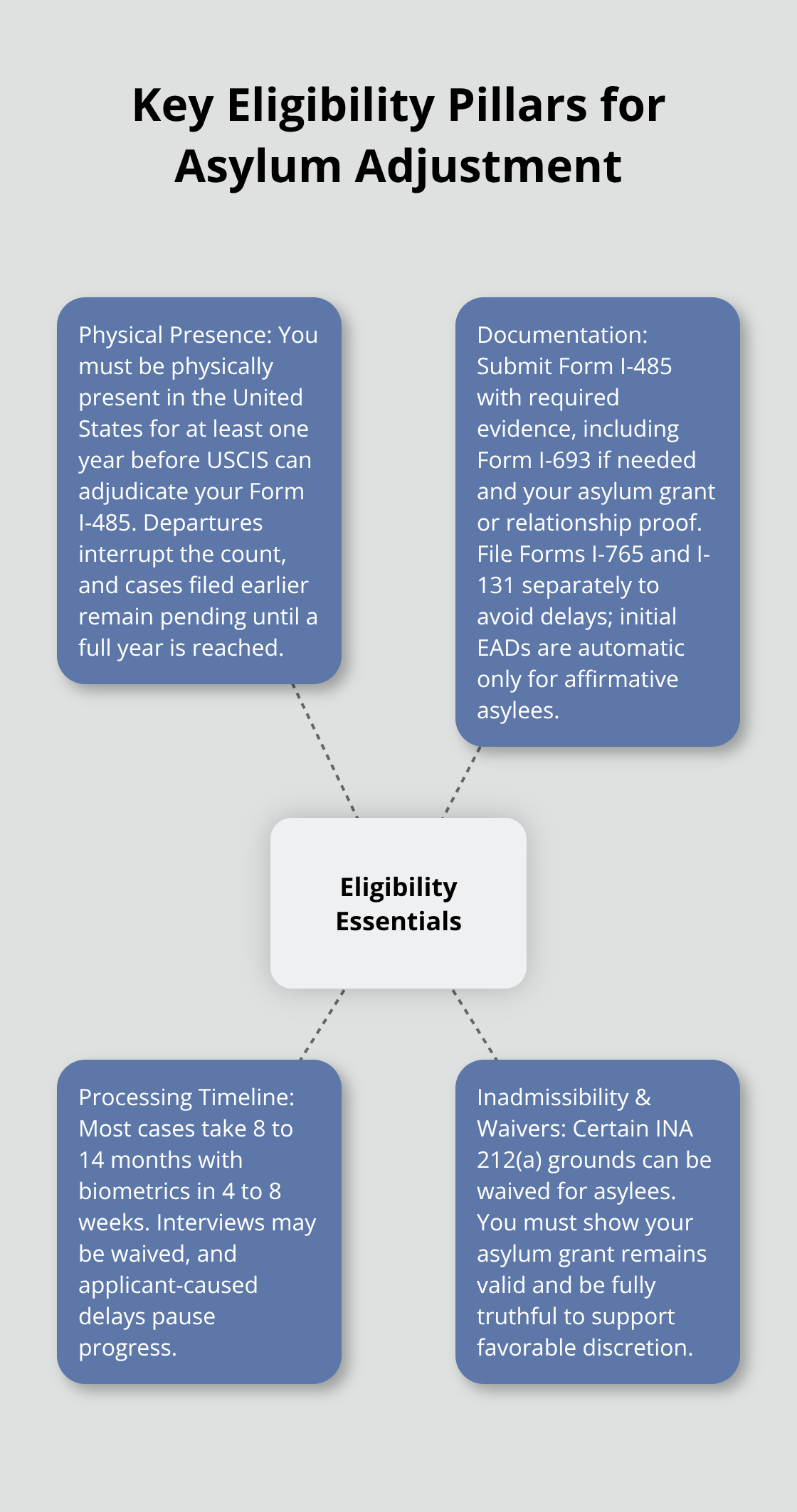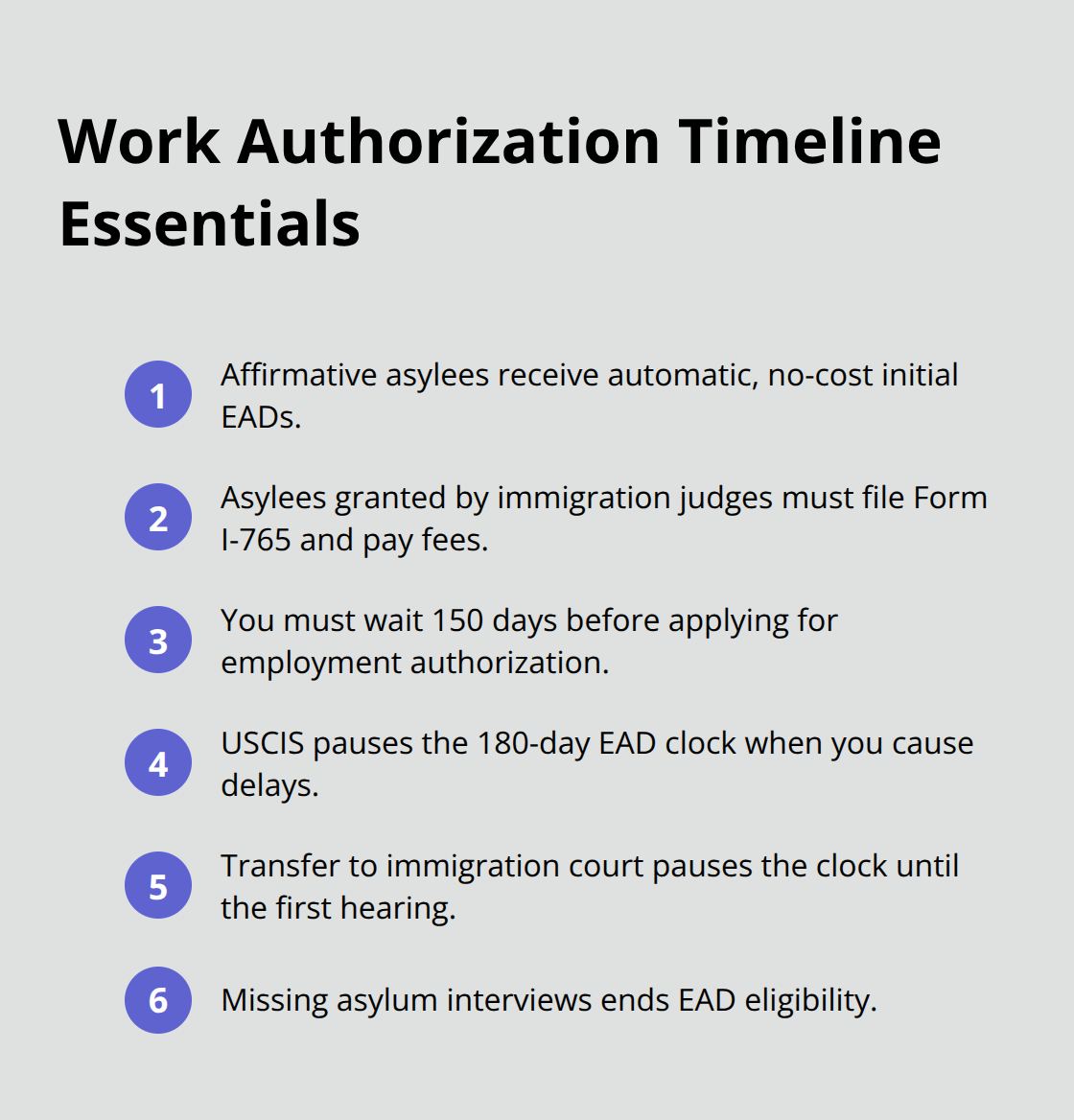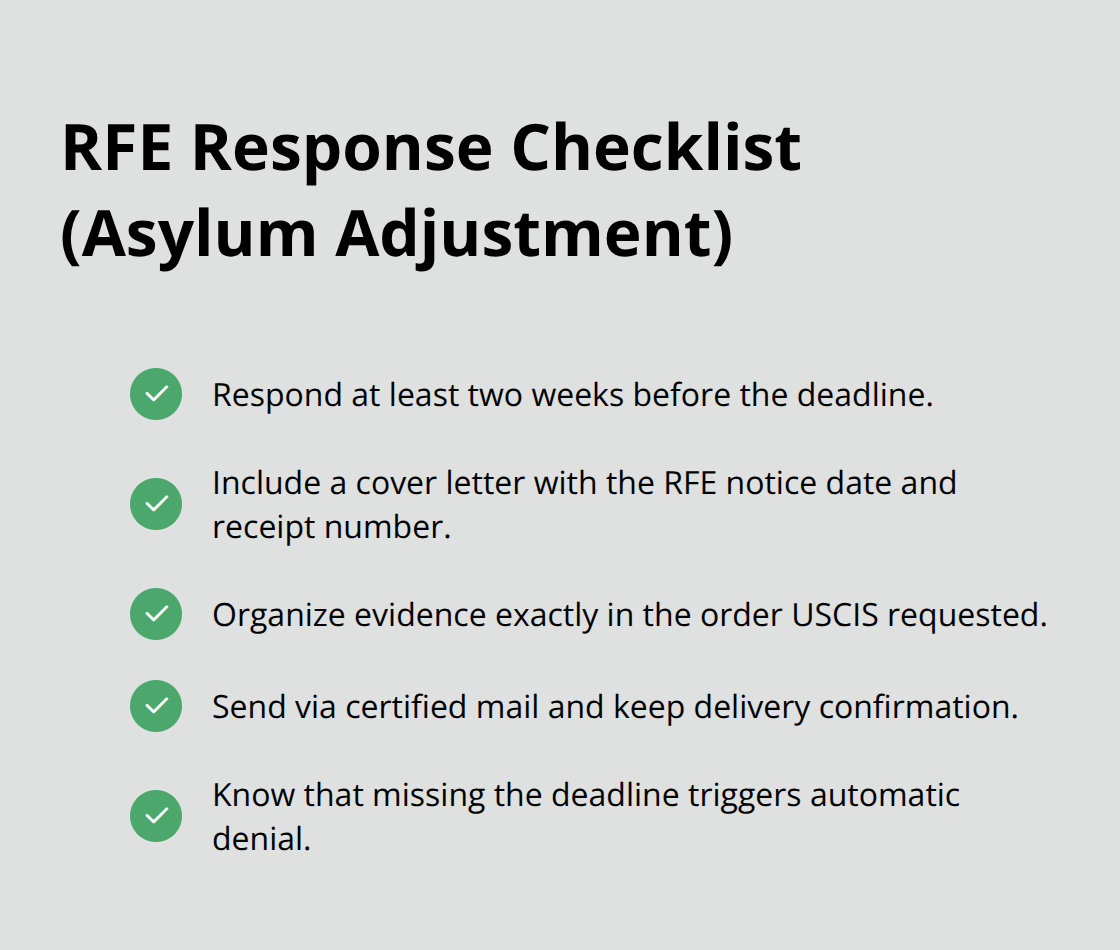
How to Handle Pending Asylum Adjustment of Status
Navigating a pending asylum adjustment of status can feel overwhelming without proper guidance. The process involves strict deadlines, complex documentation, and potential pitfalls that could harm your case.
We at Law Offices of Jeffrey A. Thompson understand these challenges firsthand. This guide provides practical steps to protect your asylum case while maintaining your legal status throughout the adjustment process.
What Makes You Eligible for Asylum Adjustment
Meeting the Physical Presence Requirement
The most stringent requirement for asylum adjustment demands physical presence in the United States for at least one year before USCIS can adjudicate your Form I-485. This rule took effect February 2, 2023, and applies to all asylees regardless of when they received asylum status. USCIS counts every single day, so departures from the US interrupt your accumulation of physical presence time. You can file your I-485 before you meet this requirement, but your case will remain pending until you complete the full year.
Documentation Requirements and Form Strategy
Your adjustment package must include Form I-485 as the primary application, plus Form I-693 medical examination if required. Principal asylees need their original asylum grant letter, while derivative asylees must provide relationship documentation like marriage or birth certificates. File Form I-765 for work authorization and Form I-131 for travel documents in separate envelopes from your I-485 to prevent processing delays. USCIS automatically issues initial work permits to asylees granted through affirmative procedures at no cost, but those granted asylum by immigration judges must apply separately.
Processing Timeline and Current Expectations
Processing times vary significantly based on your local USCIS office workload, but most cases take 8 to 14 months after you file. The biometrics appointment typically occurs within 4 to 8 weeks of your submission, followed by potential interview scheduling. USCIS may waive interviews for straightforward cases with complete documentation. Your case stops accumulating processing time if you cause delays through rescheduling or fail to respond to evidence requests within the specified timeframe.
Inadmissibility Grounds and Waiver Options
Certain inadmissibility grounds under INA 212(a) may apply to your case, but USCIS can waive specific grounds for asylees. Common issues include health-related grounds, criminal history, or immigration violations (though asylum seekers typically receive protection from unlawful presence accumulation). You must demonstrate that your asylum grant remains valid and has not been terminated. USCIS exercises discretion in these cases, so complete honesty about your background proves essential for a favorable outcome.

These eligibility requirements form the foundation of your case, but maintaining your status while USCIS processes your application presents its own set of challenges.
Common Challenges During Pending Status
Work Authorization Delays Create Employment Gaps
Your work authorization timeline depends entirely on how USCIS granted your asylum. Asylees approved through affirmative procedures receive automatic work permits at no cost, but those granted asylum by immigration judges must file Form I-765 separately and pay fees. The 150-day wait period before you can apply for employment authorization often creates significant financial hardship. USCIS stops your 180-day EAD clock whenever you cause delays through interview rescheduling or postponement requests. If your asylum case transfers to immigration court, your EAD clock pauses completely until your first hearing with an immigration judge. Missing scheduled asylum interviews eliminates your eligibility for work authorization entirely.

Travel Outside the US Abandons Your Case
Leaving the United States without advance parole approval can jeopardize your asylum application, regardless of your reason for travel. You must file Form I-131 and receive approval before any international travel, including family emergencies. The advance parole application process takes 4 to 6 months, making spontaneous travel impossible. Even with advance parole, returning to your home country creates serious risks to your asylum case (as it suggests conditions have improved enough for safe return). USCIS views any voluntary return to your country of feared persecution as evidence that contradicts your asylum claim.
Your Legal Status Remains Precarious Throughout Processing
You maintain authorized stay rather than lawful status while your asylum and I-485 applications remain pending. This distinction affects your eligibility for federal benefits that require valid non-immigrant status. You cannot accumulate unlawful presence during the pending period, but your status provides no pathway to other immigration benefits. Marriage to a US citizen allows concurrent I-485 filing while your asylum case proceeds (though dual intent concepts do not apply to asylum seekers). If USCIS denies your asylum application, you immediately face removal proceedings unless you successfully appeal to the Board of Immigration Appeals.
These challenges require proactive management to protect your case. Visa retrogression and extensive background checks can extend pending periods significantly. Understanding the complex fee structure helps you prepare financially for the process. The next section outlines specific strategies to maintain your legal standing while USCIS processes your application.
What Actions Protect Your Pending Case
Address Changes Must Reach USCIS Within 10 Days
USCIS requires notification of address changes within 10 days of your move, and failure to comply can result in case denial or missed critical notices. File Form AR-11 online through the USCIS website immediately after you relocate, then separately notify the National Benefits Center that handles your I-485 case. Mail services cannot substitute for proper USCIS notification because immigration notices require direct delivery confirmation. You will likely face application denial without the opportunity to reschedule if you miss your biometrics appointment or interview due to outdated address information.
Evidence Requests Demand Immediate Action
USCIS typically allows 84 days to respond to Requests for Evidence, but you create unnecessary risk when you wait until the deadline. Submit your response at least two weeks before the deadline to account for mail delivery delays or processing issues. Include a cover letter that directly references the RFE notice date and receipt number, then organize your evidence in the exact order USCIS requested. USCIS will automatically deny your case based on abandonment if you miss the RFE deadline, with no appeal rights available. Document every submission with certified mail and delivery confirmation to prove timely submission.

Criminal Activity and Immigration Violations Terminate Your Case
You must disclose any arrest or criminal charge to USCIS immediately during your pending period, even if authorities later dismiss or reduce charges. Traffic violations that exceed $500 in fines require disclosure, while DUI arrests always demand immediate reporting regardless of the outcome. Unauthorized employment or overstaying any permitted period can trigger inadmissibility findings that block your adjustment approval (these violations provide grounds for automatic case denial). Working without proper authorization while your case is pending violates your asylum status and provides grounds for case denial. Marriage fraud investigations can destroy both your asylum case and any concurrent family-based petitions, so you must maintain genuine relationships with complete documentation.
Final Thoughts
Your pending asylum adjustment of status demands constant attention and active management throughout the entire process. You must maintain accurate address records with USCIS, respond to all evidence requests within deadlines, and avoid any criminal activity or immigration violations that could end your case. Document every interaction with USCIS through certified mail and keep detailed records of all submissions.
Professional legal assistance becomes necessary when you face complex inadmissibility issues, receive denial notices, or encounter unexpected complications during processing. Immigration attorneys can identify potential problems before they damage your case and provide strategic guidance for challenging situations. We at Law Offices of Jeffrey A. Thompson help clients navigate these complex processes from initial paperwork through final approval.
The adjustment process demands patience and precision, but thousands of asylees successfully obtain permanent residence each year when they follow proper procedures (staying informed about policy changes proves essential for success). Stay informed about policy changes, maintain complete documentation, and seek qualified legal counsel when questions arise about your specific circumstances. Your diligence during this critical period directly impacts your path to permanent residence.


